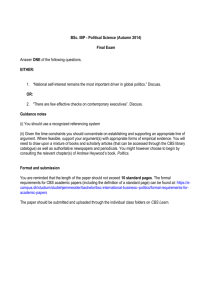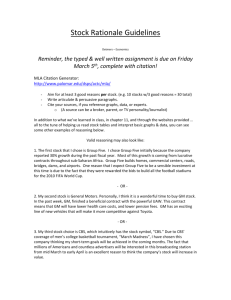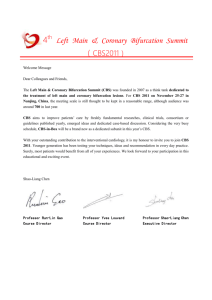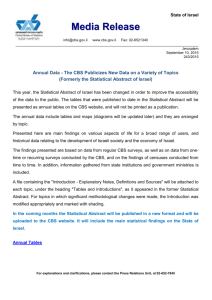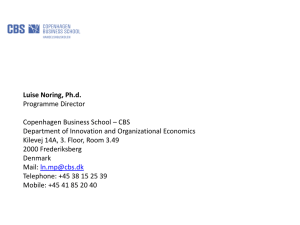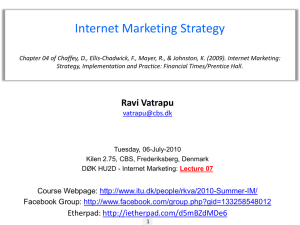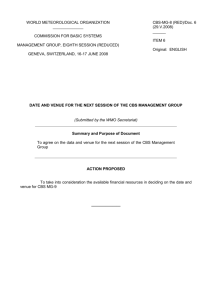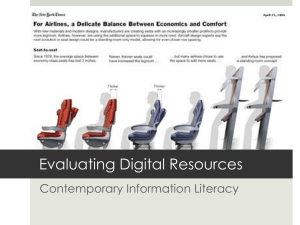Research Report
advertisement
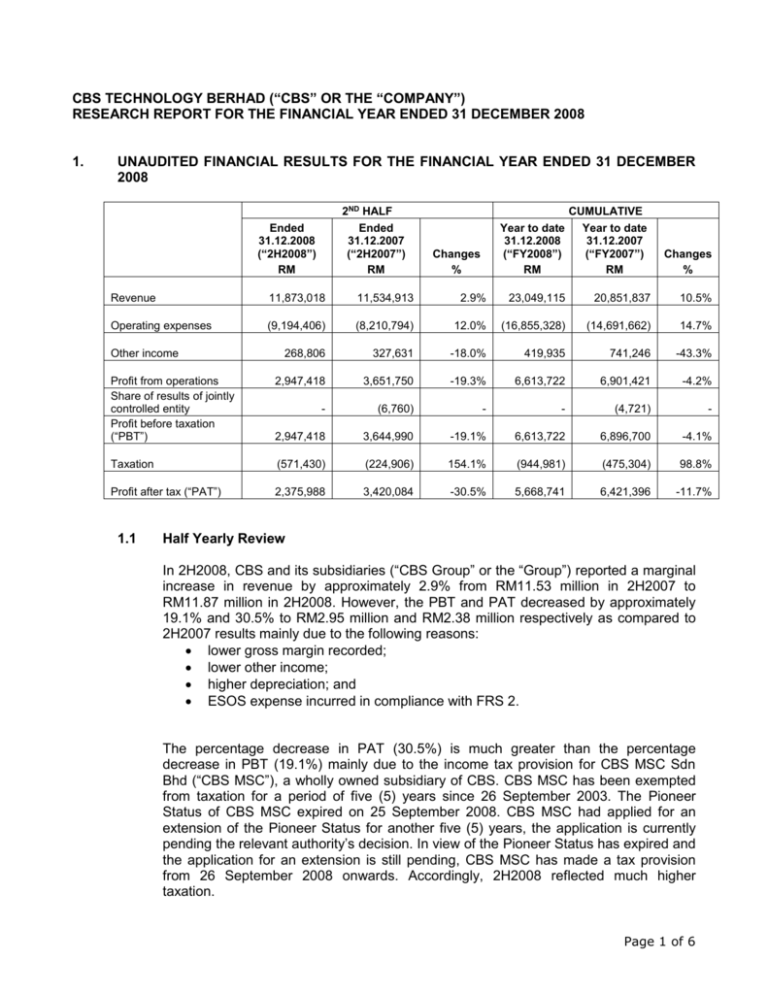
CBS TECHNOLOGY BERHAD (“CBS” OR THE “COMPANY”) RESEARCH REPORT FOR THE FINANCIAL YEAR ENDED 31 DECEMBER 2008 1. UNAUDITED FINANCIAL RESULTS FOR THE FINANCIAL YEAR ENDED 31 DECEMBER 2008 2ND HALF Ended 31.12.2007 (“2H2007”) RM Ended 31.12.2008 (“2H2008”) RM CUMULATIVE Year to date Year to date 31.12.2008 31.12.2007 (“FY2008”) (“FY2007”) RM RM Changes % Changes % Revenue 11,873,018 11,534,913 2.9% 23,049,115 20,851,837 10.5% Operating expenses (9,194,406) (8,210,794) 12.0% (16,855,328) (14,691,662) 14.7% 268,806 327,631 -18.0% 419,935 741,246 -43.3% Profit from operations Share of results of jointly controlled entity Profit before taxation (“PBT”) 2,947,418 3,651,750 -19.3% 6,613,722 6,901,421 -4.2% - (6,760) - - (4,721) - 2,947,418 3,644,990 -19.1% 6,613,722 6,896,700 -4.1% Taxation (571,430) (224,906) 154.1% (944,981) (475,304) 98.8% Profit after tax (“PAT”) 2,375,988 3,420,084 -30.5% 5,668,741 6,421,396 -11.7% Other income 1.1 Half Yearly Review In 2H2008, CBS and its subsidiaries (“CBS Group” or the “Group”) reported a marginal increase in revenue by approximately 2.9% from RM11.53 million in 2H2007 to RM11.87 million in 2H2008. However, the PBT and PAT decreased by approximately 19.1% and 30.5% to RM2.95 million and RM2.38 million respectively as compared to 2H2007 results mainly due to the following reasons: lower gross margin recorded; lower other income; higher depreciation; and ESOS expense incurred in compliance with FRS 2. The percentage decrease in PAT (30.5%) is much greater than the percentage decrease in PBT (19.1%) mainly due to the income tax provision for CBS MSC Sdn Bhd (“CBS MSC”), a wholly owned subsidiary of CBS. CBS MSC has been exempted from taxation for a period of five (5) years since 26 September 2003. The Pioneer Status of CBS MSC expired on 25 September 2008. CBS MSC had applied for an extension of the Pioneer Status for another five (5) years, the application is currently pending the relevant authority’s decision. In view of the Pioneer Status has expired and the application for an extension is still pending, CBS MSC has made a tax provision from 26 September 2008 onwards. Accordingly, 2H2008 reflected much higher taxation. Page 1 of 6 1.2 Yearly Review For FY2008, the Group reported an increase in revenue by approximately 10.5% from RM20.85 million in FY2007 to RM23.05 million in FY2008. Despite higher revenue achieved in FY2008, the PBT and PAT declined by 4.1% and 11.7% to RM6.61 million and RM5.67 million, respectively as compared to FY2007. The decrease in the PBT and PAT in FY2008 was mainly due to: lower gross margin recorded; lower other income; higher depreciation; and ESOS expense incurred in compliance with FRS 2. As mentioned in 1.1 above, the higher taxation expenses for the FY2008 was mainly due to the tax provision made for CBS MSC. 2. SUMMARY OF THE HISTORICAL FINANCIAL RESULTS OF THE CBS GROUP Revenue PBT PBT Margin (%) PAT Weighted average number of ordinary shares in issue Gross earnings per share (sen) Net earnings per share (sen) 2004 Group Audited RM 11,074,559 4,257,348 38.44% 3,518,932 Financial Year Ended 31 December (“FY”) 2005 2006 2007 2008 Group Group Group Group Audited Audited Audited Unaudited RM RM RM RM 14,896,813 15,887,018 20,851,837 23,049,115 4,318,897 5,343,883 6,896,700 6,613,722 28.99% 33.64% 33.07% 28.69% 4,004,589 4,994,820 6,421,396 5,668,741 97,232,260 4.99 97,344,375 4.44 98,081,485 5.45 99,144,400 6.96 151,739,187 4.38 4.13 4.11 5.09 6.48 3.70 Notes: a) Financial results for the FY2005 were restated to comply with new and revised Financial Reporting Standards. b) The gross and net earnings per share for the unaudited financial results FY2008 was calculated after taking into account the number of shares in issue after the Bonus Issue of 50,556,330 new ordinary shares of RM0.10 each which were allotted on 14 April 2008 and the minority interest. Page 2 of 6 3. INDUSTRY OUTLOOK Outlook of Malaysian Economy The Malaysian economy has been resilient in the first-half of 2008, but is not going to be insulated from the global downturn. As the external sector worsened, GDP growth has subsided to 4.7% in third quarter of 2008 (“3Q08”) after a strong 7.1% gain in the first-half of 2008 (revised upwards from 6.7%), bringing growth to an average of 6.3% in the first three quarters of 2008. Resilient private consumption, steady public investment and higher fiscal spending supported the growth in 3Q08. Malaysia has no direct exposure to the US market but is increasingly feeling the shock from the slowing global economy through trade and investment linkages. Fearing a dismal global outlook that would hurt the domestic economy, the government stretched its fiscal deficit to 4.8% in 2008, reversing a 7-year progressive deficit reduction. A RM7 billion stimulus package, to be financed by savings from subsidy reduction, was unveiled in November 2008 as a measure to stimulate domestic demand. The deficit fiscal target for 2009 has also been raised to 4.8% of GDP, from 3.6% previously. This may be justified as difficult times call for drastic measures. However, there are concerns that government revenue would be adversely affected by the falling commodity prices, which could subsequently enlarge the deficit to even exceed 5.0% of GDP, especially now that there is a possibility of an additional stimulus package being introduced by mid-2009. Given the worsening external conditions, it is likely that Malaysia’s growth would deteriorate in 2009, as it takes the hit from the knock-on effects of a flagging global economy. With limited room for policy flexibility, domestic demand can be propped up by fiscal pump-priming and easier monetary policy, providing a partial cushion to the uncertain global economy. Falling commodity prices are not helping either, but may help put a lid on inflationary pressures. The services sector will be the pillar of strength amidst a weak manufacturing sector. In light of the deeper declines in macro indicators, the tumble in business and consumer confidence, and the dismal sectoral indices, we are compelled to adjust our estimated 2008 GDP growth to 5.1% from 5.5 previously and to revise our forecast for 2009 downwards to 1.3% from 3.4% earlier. Provided that the global economy bottoms out, as projected by the World Bank with global growth recovering to 3.9% in 2010, a marginal improvement is foreseen for Malaysia’s growth to inch up to 3.8% in 2010. (Source: Malaysia Institute of Economic Research (“MIER”)) Page 3 of 6 Industry Outlook on the Information Communications and Telecommunications (“ICT”) Sector Despite a recent downward adjustment in forecast for 2009, Asia/Pacific remains the bright spot in the global marketplace as businesses look towards leveraging IT to drive business process optimization and competitive share of wallet growth. The robust growth that Asia enjoyed over the last decade had led to strong financial positioning for many businesses and consumers. This has put Asia in a relatively favorable position to invest in IT to ride the current storm as well as to emerge competitively stronger when the economies turnaround. IDC today lowered its 2009 information technology spending (IT spending) forecast for the Asia/Pacific Excluding Japan (APEJ) region to 5.8% from its initial 9.5% ‘pre-crisis’ forecast in July 2008. Compared to the US and the rest of the world, APEJ is still in a good position. IDC expects IT spending in APEJ to reach US$195.6 billion, down from an earlier projection of US$201.4 billion. The Malaysian government is expected to cushion some negative impact with a series of different ICT related initiatives supporting domestic demand. The promotion of Malaysia as a potential shared services hub may continue to support business investments, however, the outlook for export of goods and services is weakening. Increasing unemployment levels and lower disposable income will likely lower consumer spend on IT. IDC expects the 2009 IT market value to be adjusted down by US$186 million to reach US$6 billion and the market growth reduced from 7.6% to 4.4%. (Source: IDC Market Research (M) Sdn Bhd (“IDC Malaysia”) – Press Release dated 1 December 2008, www.idc.com.my) 4. FUTURE PROSPECTS In view of the current economic situation, many companies are likely to take highly cautious approach towards ICT spending and budget. The Group expects to face a challenging and competitive business environment in 2009. To weather the current economic downturn and to remain profitable in 2009, the Group will take stern measures to improve efficiency and continue to enhance and develop innovative products and introduce new line of business and services. Barring any unforeseen circumstances, the Board of Directors of CBS expects the Group to achieve a satisfactory performance for the financial year ending 31 December 2009. Page 4 of 6 5. BUSINESS DEVELOPMENT PLAN UPDATES During the FY31 December 2008, the Group carried out its business development plan which covered the following: a) Continuous enhancement of existing product range and development of new products CBS strives to enhance the existing products and develop new innovative products that meet its customers’ requirements. Albeit these unfavourable economic situations, the Group believes that there will be more businesses are looking into using Radio Frequency Identification (“RFID”) to improve their business operations especially in the supply chain management. Hence, CBS will be focusing on expanding its RFID product range into the supply chain management applications. The RFID supply chain applications can improve the manufacturing and retail operations, from forecasting demand to planning, managing inventory and distribution, and improving the in-store customer experience, enabling enterprises to realize significant savings, increase productivity and efficiency in their business operations. b) Building strong sales and marketing team CBS will continue to build a strong sales and marketing team to expand its product offerings to other sector and to sustain its growth by penetrating further into the existing markets. To create product awareness on CBS’s RFID solutions, CBS will continue to carry out the marketing activities. c) Expansion into the overseas market by leveraging on strategic alliances’ strengths As mentioned in the Company’s previous Research Reports, CBS Group has formed strategic alliances with its foreign partners in Thailand, Indonesia, Philippines and Dubai to market its PaymateTM and SolmateTM solutions in the ASEAN and Middle East Region. Over the past one year, the Group has successfully secured some businesses through its strategic alliances. CBS will continue to leverage on its partners’ strength to penetrate and widen the overseas market coverage. The business development plans of the Group will continue to be implemented as planned and are expected to contribute positively to the financial performance of the Group for the financial year ending 31 December 2009. 6. RESEARCH & DEVELOPMENT (“R&D”) In the second half of 2008, CBS has successfully enhanced the capability of its RFID Warehouse Management application. It is currently being deployed in a large utility company in Malaysia, where it is used to manage large amounts of inventory in its central warehouse. During this economic situation, the Group believes that more enterprises will look into increasing the efficiency of their business operations especially on the supply chain management. Moving forward, the R&D activities of the Group will be focused more on expanding the RFID product range into the supply chain management solutions. Page 5 of 6 To maintain its leadership in RFID solutions and to keep in pace with the advanced technology, CBS is also constantly evaluating on how the new RFID technologies may be incorporated into its product suites. During 2008, CBS conducted R&D activities on various active RFID tags and devices to be incorporated into the Solmate™ suite of products such as RFID Warehouse Management applications. The research is aimed to evaluate the ability of RFID technology and devices in meeting the customers’ specific requirements. As at 31 December 2008, the Group has a total staff strength of 22 in its R&D team which remain unchanged since 30 June 2008. Total R&D expenditure incurred for the financial year ended 31 December 2008 was RM0.68 million. The Board of Directors of CBS is of the view that the R&D expenditure and future allocation of R&D will not result in any material financial impact on the Group. Barring unforeseen circumstances, the new modules and products developed by the Group are expected to contribute positively to its future earnings. 7. LIST OF TEN LARGEST SHAREHOLDERS OF CBS The details of the 10 largest shareholders of CBS according to the Record of Depositors as at 31 December 2008 are as follows: No. 1. 2. 3. 4. 5. 6. 7. 8. 9. 10. 8. Name of shareholder Emirates Investment & Development Co Sun Chee Kong HSBC Nominees (Asing) Sdn Bhd – Qualifier: Exempt An for Credit Suisse (SG BR-TST-Asing) Tan Chong Chew @ Tan Ying Ying CIMSEC Nominees (Tempatan) Sdn Bhd – Qualifier: CIMB Bank for Tan Tian Sin (MY0027) Phan Tje Mei On Thiam Chai Yong Mei Ping Nyuk Ying @ Chong Nyuk Ying Inter-Pacific Equity Nominees (Tempatan) Sdn Bhd - Qualifier: Inter-Pacific Asset Management Sdn Bhd for Lee Peng Leong No. of shares held 37,500,000 18,545,295 6,570,750 % 24.70 12.22 4.33 6,568,245 3,690,200 4.33 2.43 3,406,500 3,072,000 2,769,750 2,203,000 2,169,250 2.24 2.02 1.82 1.45 1.43 FINANCIAL FORECAST The Company has not provided any financial forecast in any public documents. 9. Status of Utilisation of Proceeds Raised There were no unutilised proceeds as at 31 December 2008. Page 6 of 6
